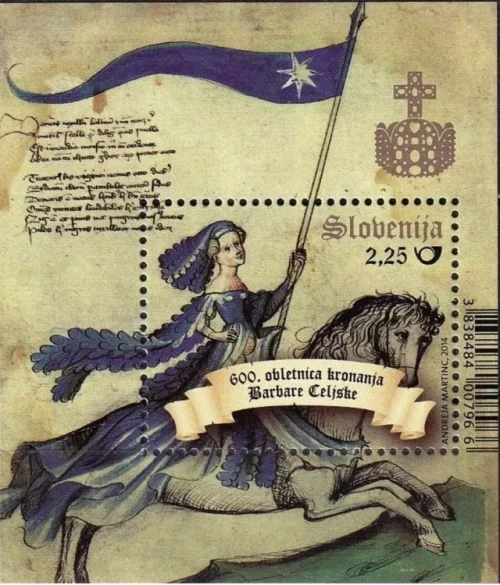Slovenia postage stamps year 2014 Barbara of Cilli MNH MSS
Slovenia issued a postage stamp in 2014 commemorating Barbara of Cilli (Barbara Celjska) — specifically for the 600th anniversary of her coronation — and it was part of a special philatelic and numismatic release by Pošta Slovenije.
🇸🇮 Slovenia 2014 – Barbara of Cilli Stamp Issue
📮 Stamp & Philatelic Release
- Theme: Barbara of Cilli (Barbara Celjska in Slovenian) — 600th anniversary of her coronation
- Year of Issue: 2014
- Issuer: Pošta Slovenije
- The stamp was issued in connection with a special filatelistično‑numizmatični komplet (stamp and coin set) celebrating the historical figure.
Barbara of Cilli was a historically important noblewoman from Celje who became Queen (and later Holy Roman Empress) through her marriage to Emperor Sigismund. Her coronation in 1414 was a significant event in Central European history — and Slovenia commemorated its 600th anniversary with this special issue.
📦 Philatelic‑Numismatic Set
Rather than a standalone stamp only, Pošta Slovenije released this Barbara Celjska issue as part of a stamp and coin set. This typically includes:
- A special postage stamp (often in a souvenir sheet or block format) celebrating Barbara of Cilli.
- A commemorative €2 coin also dedicated to the same anniversary, issued by the Bank of Slovenia.
This combined release makes it a popular item for both stamp collectors and numismatists.
📝 Collecting Details
- Philatelic set name: Filatelistično‑numizmatični komplet – Barbara Celjska
- Typical catalogue reference: Often listed under the year 2014 in Slovenian issuing lists and annual sets from Pošta Slovenije.
- Formats seen in the collector market: souvenir sheet/block with the Barbara Celjska motif.










Reviews
There are no reviews yet.